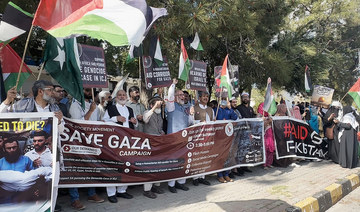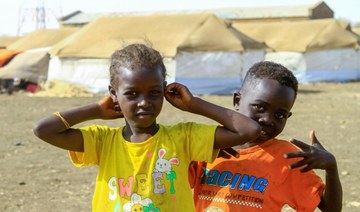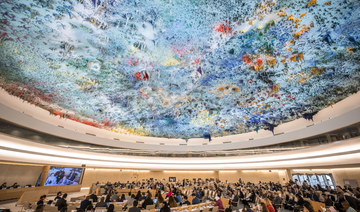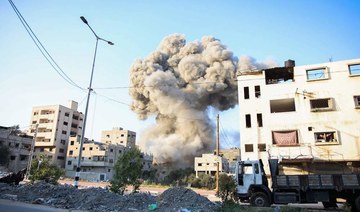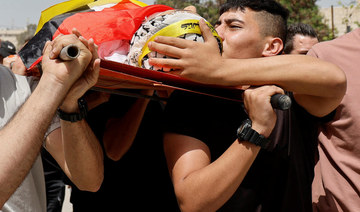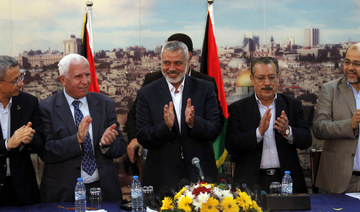NEW YORK: After being arrested for creating antigovernment propaganda in 2010, the Iranian director Jafar Panahi was banned from making films for 20 years. Since then, he’s made five widely acclaimed features.
His latest, “No Bears,” opens soon in US theaters while Panahi is in prison.
In July, Panahi went to the Tehran prosecutor’s office to inquire about the arrest of Mohammad Rasoulof, a filmmaker detained in the government’s crackdown on protests. Panahi himself was arrested and, on a decade-old charge, sentenced to six years in jail.
Panahi’s films, made in Iran without government approval, are sly feats of artistic resistance. He plays himself in meta self-portraitures that clandestinely capture the mechanics of Iranian society with a humanity both playful and devastating. Panahi made “This is Not a Film” in his apartment. “Taxi” was shot almost entirely inside a car, with a smiling Panahi playing the driver and picking up passengers along the way.
In “No Bears,” Panahi plays a fictionalized version of himself while making a film in a rural town along the Iran-Turkiye border. It’s one of the most acclaimed films of the year. The New York Times and The Associated Press named it one of the top 10 films of the year. Film critic Justin Chang of The Los Angeles Times called “No Bears” 2022’s best movie.
“No Bears” is landing at a time when the Iranian film community is increasingly ensnarled in a harsh government crackdown. A week after “No Bears” premiered at the Venice Film Festival, with Panahi already behind bars, 22-year-old Mahsa Amini died while being held by Iran’s morality police. Her death sparked three months of women-led protests, still ongoing, that have rocked Iran’s theocracy.
More than 500 protesters have been killed in the crackdown since Sept. 17, according to the group Human Rights Activists in Iran. More than 18,200 people have been detained.
On Saturday, the prominent Iranian actress Taraneh Alidoosti, star of Asghar Farhadi’s Oscar-winning “The Salesman,” was arrested after posting an Instagram message expressing solidarity with a man recently executed for crimes allegedly committed during the protests.
In the outcry that followed Alidoosti’s arrest, Farhadi — the director of “A Separation” and “A Hero” — called for Alidoosti’s release “alongside that of my other fellow cineastes Jafar Panahi and Mohammad Rasoulof and all the other less-known prisoners whose only crime is the attempt for a better life.”
“If showing such support is a crime, then tens of millions of people of this land are criminals,” Farhadi wrote on Instagram.
Panahi’s absence has been acutely felt on the world’s top movie stages. At Venice, where “No Bears” was given a special jury prize, a red-carpet walkout was staged at the film’s premiere. Festival director Alberto Barbera and jury president Julianne Moore were among the throngs silently protesting the imprisonment of Panahi and other filmmakers.
“No Bears” will also again test a long-criticized Academy Awards policy. Submissions for the Oscars’ best international film category are made only by a country’s government. Critics have said that allows authoritative regimes to dictate which films compete for the sought-after prize.
Arthouse distributors Sideshow and Janus Films, which helped lead Ryusuke Hamaguchi’s Japanese drama “Drive My Car” to four Oscar nominations a year ago, acquired “No Bears” with the hope that its merit and Panahi’s cause would outshine that restriction.
“He puts himself at risk every time he does something like this,” says Jonathan Sehring, Sideshow founder and a veteran independent film executive. “When you have regimes that won’t even let a filmmaker make a movie and in spite of it they do, it’s inspiring.”
“We knew it wasn’t going to be the Iranian submission, obviously,” adds Serling. “But we wanted to position Jafar as a potential best director, best screenplay, a number of different categories. And we also believe the film can work theatrically.”
The Academy of Motion Pictures Arts and Sciences declined to comment on possible reforms to the international film category. Among the 15 shortlisted films for the award announced Wednesday was the Danish entry “Holy Spider,” set in Iran. After Iranian authorities declined to authorize it, director Ali Abbasi shot the film, based on real-life serial killings, in Jordan.
“No Bears” opens in New York on Dec. 23 and Los Angeles on Jan. 10 before rolling out nationally.
In it, Panahi rents an apartment from which he, with a fitful Internet signal, directs a film with the help of assistants. Their handing off cameras and memory cards gives, perhaps, an illuminating window into how Panahi has worked under government restrictions. In “No Bears,” he comes under increasing pressure from village authorities who believe he’s accidentally captured a compromising image.
“It’s not easy to make a movie to begin with, but to make it secretly is very difficult, especially in Iran where a totalitarian government with such tight control over the country and spies everywhere,” says Iranian film scholar and documentarian Jamsheed Akrami-Ghorveh. “It’s really a triumph. I can’t compare him with any other filmmaker.”
In one of the film’s most moving scenes, Panahi stands along the border at night. Gazing at the lights in the distance, he contemplates crossing it — a life in exile that Panahi in real life steadfastly refused to ever adopt.
Some aspects of the film are incredibly close to reality. Parts of “No Bears” were shot in Turkiye just like the film within the film. In Turkiye, an Iranian couple (played by Mina Kavani and Bakhiyar Panjeei) are trying to obtain stolen passports to reach Europe.
Kavani herself has been living in exile for the last seven years. She starred in Sepideh Farsi’s 2014 romance “Red Rose.” When nudity in the film led to media harassment, Kavani chose to live in Paris. Kavani was struck by the profound irony of Panahi directing her by video chat from over the border.
“This is the genius of his art. The idea that we were both in exile but on a different side was magic,” says Kavani. “He was the first person that talked about that, what’s happening to exiled Iranian people outside of Iran. This is very interesting to me, that he is in exile in his own country, but he’s talking about those who left his country.”
Many of Panahi’s colleagues imagine that even in his jail cell, Panahi is probably thinking through his next film — whether he ever gets to make it or not. When “No Bears” played at the New York Film Festival, Kavani read a statement from Panahi.
“The history of Iranian cinema witnesses the constant and active presence of independent directors who have struggled to push back censorship and to ensure the survival of this art,” it said. “While on this path, some were banned from making films, others were forced into exile or reduced to isolation. And yet, the hope of creating again is a reason for existence. No matter where, when, or under what circumstances, an independent filmmaker is either creating or thinking.”
An Iranian masterwork opens with its director behind bars
https://arab.news/jg5us
An Iranian masterwork opens with its director behind bars
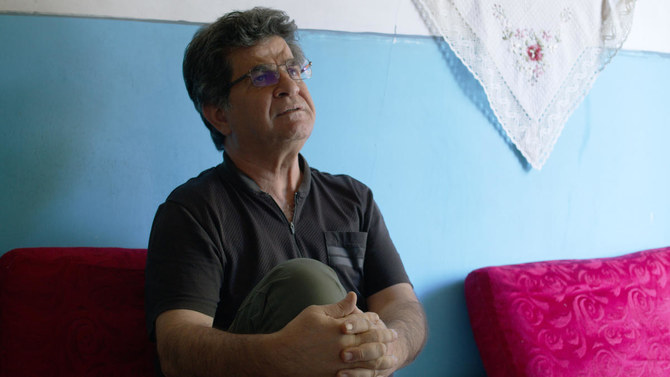
- In July, Panahi went to the Tehran prosecutor’s office to inquire about the arrest of Mohammad Rasoulof, a filmmaker detained in the government’s crackdown on protests
- Panahi himself was arrested and, on a decade-old charge, sentenced to six years in jail
Ships from Turkiye planning to deliver aid to Gaza were denied right to sail
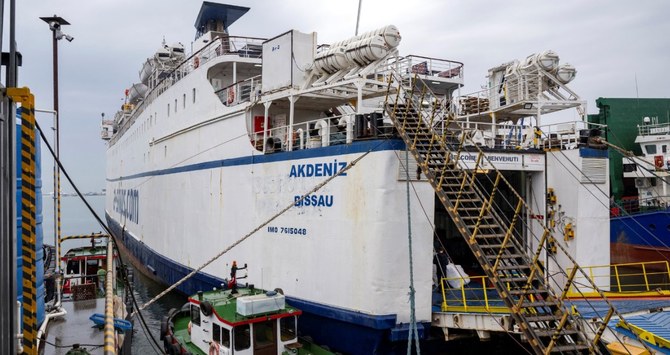
- The Freedom Flotilla Coalition described the cancelation of the vessels’ registry as a “blatantly political move,” adding: “Without a flag, we cannot sail”
- The organizers blamed Israel for applying pressure to prevent the flotilla
ISTANBUL: A three-ship flotilla planning to reach Gaza with humanitarian aid from Turkiye was prevented from sailing by Guinea-Bissau authorities, which took down their country’s flags from two ships, organizers said.
Just before the flotilla was set to sail from Turkiye to Gaza on Friday with 5,000 tons of aid, a surprise inspection by the Guinea-Bissau International Ships Registry resulted in the removal of the flags from two of the Freedom Flotilla ships.
A press release by the Freedom Flotilla Coalition described the cancelation of the vessels’ registry as a “blatantly political move,” adding: “Without a flag, we cannot sail.”
The organizers blamed Israel for applying pressure to prevent the flotilla. “It is obvious, and I think it is publicly known, that there has been close contact between Israel and the president of Guinea-Bissau,” organizer and steering committee member Torstein Dahle told The Associated Press, without elaborating.
He said that hundreds of Turkish and international participants were disappointed by the cancelation. “It is very hard for us, because it takes time to procure a flag. It’s a procedure that can’t be done in a few days. ... But we’re not giving up.”
The Freedom Flotilla Coalition includes Turkish and international organizations, among them the IHH and the Mavi Marmara Association from Turkiye, which also organized an ill-fated 2010 flotilla.
On May 31, 2010, Israeli commandos stormed the Mavi Marmara in international waters, leading to an altercation that left nine people dead and dozens of activists wounded. On the Israeli side, seven soldiers were wounded by activists who attacked them with clubs, knives and pipes.
Lebanon moves toward accepting ICC jurisdiction for war crimes on its soil
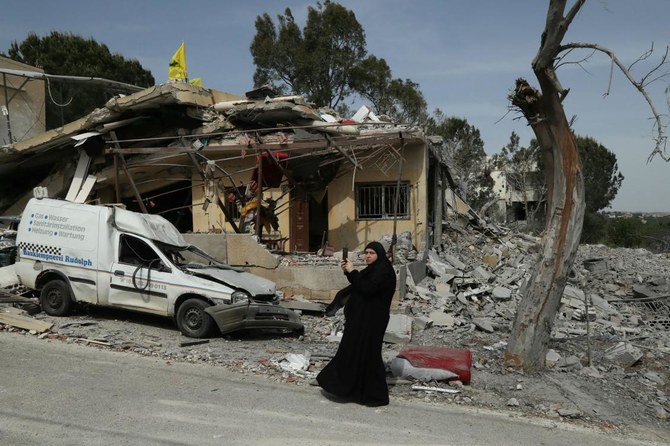
- Neither Lebanon nor Israel are members of the ICC
- Filing a declaration to the court would grant it jurisdiction to investigate and prosecute relevant crimes in a particular period
BEIRUT: Lebanon has moved toward accepting the International Criminal Court’s jurisdiction to prosecute violations on Lebanese territory since October, in what Human Rights Watch said on Saturday was a “landmark step” toward justice for war crimes.
Lebanon has accused Israel of repeatedly violating its sovereignty and committing breaches of international law over the last six months, during which the Israeli military and Lebanese armed group Hezbollah have traded fire across Lebanon’s southern border in parallel with the Gaza War.
That cross-border shelling has killed at least 70 civilians, including children, rescue workers and journalists, among them Reuters visuals reporter Issam Abdallah, who was killed by an Israeli tank on Oct. 13, a Reuters investigation found.
Lebanon’s caretaker cabinet voted on Friday to instruct the foreign affairs ministry to file a declaration with the ICC accepting the court’s jurisdiction to investigate and prosecute crimes committed on Lebanese territory since Oct. 7.
The decree also instructed the foreign ministry to include in its complaints about Israel to the United Nations a report prepared by the Netherlands Organization for Applied Scientific Research (TNO), an independent research institute.
That report looked specifically into Abdallah’s killing, and was produced by examining shrapnel, flak jackets, a camera, tripod and a large piece of metal that were gathered by Reuters from the scene, as well as video and audio material.
Neither Lebanon nor Israel are members of the ICC, which is based in The Hague. But filing a declaration to the court would grant it jurisdiction to investigate and prosecute relevant crimes in a particular period.
Ukraine has twice filed such declarations, which allowed for the court to investigate alleged Russian war crimes.
“The Lebanese government has taken a landmark step toward securing justice for war crimes in the country,” said Lama Fakih, Middle East and North Africa director at Human Rights Watch, urging the foreign minister to “swiftly” formalize the move by filing a declaration to the ICC.
“This is an important reminder to those who flout their obligations under the laws of war that they may find themselves in the dock,” Fakih said.
British troops may be tasked with delivering Gaza aid, BBC report says
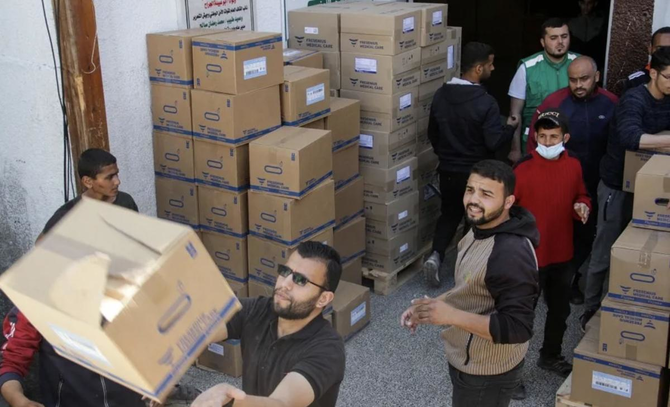
- Britain is already providing logistical support for construction of US pier, including a Royal Navy ship that will house hundreds of American soldiers
LONDON: British troops may be tasked with delivering aid to Gaza from an offshore pier now under construction by the US military, the BBC reported Saturday. UK government officials declined to comment on the report.
According to the BBC, the British government is considering deploying troops to drive the trucks that will carry aid from the pier along a floating causeway to the shore. No decision has been made and the proposal hasn’t yet reached Prime Minister Rishi Sunak, the BBC reported, citing unidentified government sources.
The report comes after a senior US military official said on Thursday that there would be no American “boots on the ground” and another nation would provide the personnel to drive the delivery trucks to the shore. The official, who spoke to reporters on condition of anonymity to discuss details not yet made public, declined to identify the third party.
Britain is already providing logistical support for construction of the pier, including a Royal Navy ship that will house hundreds of US soldiers and sailors working on the project.
In addition, British military planners have been embedded at US Central Command in Florida and in Cyprus, where aid will be screened before shipment to Gaza, for several weeks, the UK Ministry of Defense said on Friday.
The UK Hydrographic Office has also shared analysis of the Gaza shoreline with the US to aid in construction of the pier.
“It is critical we establish more routes for vital humanitarian aid to reach the people of Gaza, and the UK continues to take a leading role in the delivery of support in coordination with the US and our international allies and partners,” Defense Secretary Grant Shapps said in a statement.
Development of the port and pier in Gaza comes as Israel faces widespread international criticism over the slow trickle of aid into the Palestinian territory, where the United Nations says at least a quarter of the population sits on the brink of starvation.
The Israel-Hamas began with a Hamas-led attack into southern Israel on Oct. 7, in which militants killed around 1,200 people, mostly civilians, and took some 250 people as hostages. Israel says the militants are still holding around 100 hostages and the remains of more than 30 others. Since then, more than 34,000 Palestinians have been killed in Israel’s air and ground offensive, according to the Health Ministry in Hamas-run Gaza, around two-thirds of them children and women.
Israeli soldiers kill two Palestinian gunmen in West Bank, military says
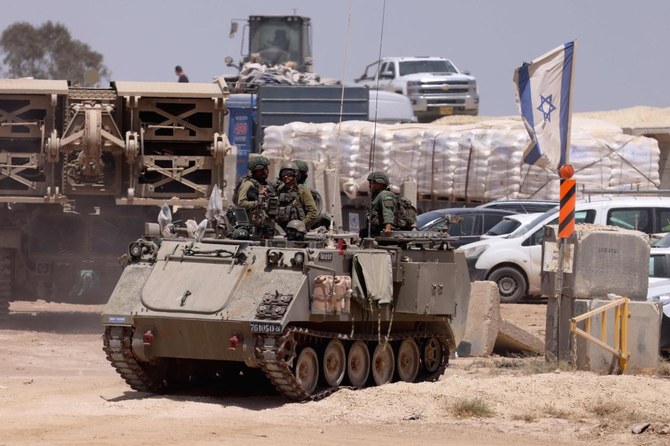
- Violence has been on the rise as Israel presses its attacks and bombardment in Gaza
RAMALLAH, West Bank: Israeli soldiers killed two Palestinian gunmen who opened fire at them from a vehicle in the occupied West Bank, the military said on Saturday.
The military released a photo of two automatic rifles that it said were used by several gunmen to shoot at the soldiers, at an outpost near the flashpoint Palestinian city of Jenin.
The official Palestinian news agency Wafa said security officials confirmed two deaths and the health ministry said two other men were wounded.
There was no other immediate comment from Palestinian officials in the West Bank, where violence has been on the rise as Israel presses its war against Palestinian militant group Hamas in Gaza.
Israel launched its offensive in Gaza after Hamas led an attack on southern Israel on Oct. 7 in which 1,200 people were killed and 253 taken hostage. More than 34,000 Palestinians have since been killed and most of the population displaced.
Violence in the West Bank, which had already been on the rise before the war, has since flared with stepped up Israeli raids and Palestinian street attacks.
The West Bank and Gaza, territories Israel captured in the 1967 war, are among the territories which the Palestinians seek for a state. US-brokered peace talks collapsed a decade ago.
Hamas says it received Israel’s response to its ceasefire proposal
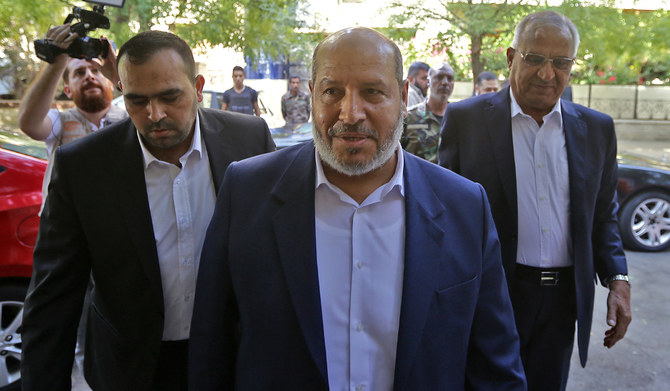
- White House national security adviser Jake Sullivan said on Friday he saw fresh momentum in talks to end the war and return the remaining hostages
- Israel has killed more than 34,000 Palestinians in Gaza, mostly women and children, according to the health ministry in the Hamas-run territory
CAIRO: Hamas said it had received on Saturday Israel’s official response to its latest ceasefire proposal and will study it before submitting its reply, the group’s deputy Gaza chief said in a statement.
“Hamas has received today the official response of the Zionist occupation to the proposal presented to the Egyptian and the Qatari mediators on April 13,” Khalil Al-Hayya, who is currently based in Qatar, said in a statement published by the group.
After more than six months of war with Israel in Gaza, the negotiations remain deadlocked, with Hamas sticking to its demands that any agreement must end the war.
An Egyptian delegation visited Israel for discussion with Israeli officials on Friday, looking for a way to restart talks to end the conflict and return remaining hostages taken when Hamas fighters stormed into Israeli towns on Oct. 7, an official briefed on the meetings said.
The official, who spoke on condition of anonymity, said Israel had no new proposals to make, although it was willing to consider a limited truce in which 33 hostages would be released by Hamas, instead of the 40 previously under discussion.
On Thursday, the United States and 17 other countries appealed to Hamas to release all of its hostages as a pathway to end the crisis.
Hamas has vowed not to relent to international pressure but in a statement it issued on Friday it said it was “open to any ideas or proposals that take into account the needs and rights of our people.”
However, it stuck to its key demands that Israel has rejected, and criticized the joint statement issued by the USand others for not calling for a permanent ceasefire and the withdrawal of Israeli forces from Gaza.
White House national security adviser Jake Sullivan said on Friday he saw fresh momentum in talks to end the war and return the remaining hostages.
Citing two Israeli officials, Axios reported that Israel told the Egyptian mediators on Friday that it was ready to give hostage negotiations “one last chance” to reach a deal with Hamas before moving forward with an invasion of Rafah, the last refuge for around a million Palestinians who fled Israeli forces further north in Gaza earlier in the war.
Meanwhile, in Rafah, Palestinian health officials said an Israeli air strike on a house killed at least five people and wounded others.
Hamas fighters stormed into Israeli towns on Oct. 7, killing 1,200 people and capturing 253 hostages. Israel has sworn to annihilate Hamas in an onslaught that has killed more than 34,000 Palestinians.





